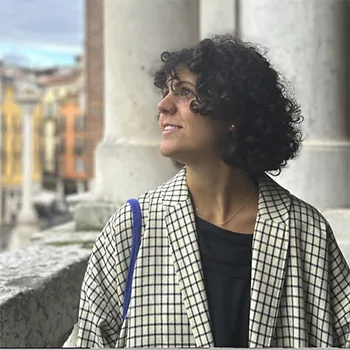
What first attracted you to the field of Engineering?
I’ve come to understand that being a systems thinker means being attracted to a multitude of fields. Throughout my academic journey, I have ‘danced’ with the many disciplines that shape the built environment—architecture, anthropology, sociology, environmental and building engineering, to name a few. I was selected for a dual MSc program where, alongside their master’s curriculum, architects, engineers and designers were brought together in intensive ‘schools’ to learn how to address wicked problems, such as climate change. I became fascinated by intersections, a passion that brought me to systems thinking.
After graduating in Architecture, I pursued a PhD in Architecture and Sciences of the City at EPFL Lausanne. However, my thesis was conducted in the Environmental Engineering school (the Laboratory for Human-Environment Relations in Urban Systems). My subsequent research at the UCL Institute for Environmental Design and Engineering confirmed that my work was bound to lie at the intersection of the many disciplines that contribute to shaping the built environment.
What do you think is the biggest misconception people have about Engineering?
As an architect, I have often found myself in debates between the engineering and architecture professions, and the many stereotypes they fuel. Engineers are frequently seen as ‘problem solvers’ who care little for form, culture or beauty. This notion—that engineering is devoid of creativity, or that engineers are merely executors—can perpetuate itself through those very professionals, resulting in a form of (political) disempowerment. I recall my grandfather, a mechanical engineer, whose library overflowed with volumes on art, poetry, music and the history of religions, while his home was filled with tools, art and design. Over time, I have learnt to appreciate the interconnectedness of our professions; in this broader framework, studying engineering has to do with learning to respond to societal challenges in genuinely creative ways.
What’s the biggest mystery in science you’d love to solve or see solved?
My current work applies systems thinking to the housing crisis and the dynamics that perpetuate it—driven by an economy focused solely on unquestioned growth. The year 1972, marked by the publication of The Limits to Growth, stands out as a pivotal moment in our understanding of human-environment interactions.
Observing how every effort to counteract the current system has dissipated over history (including the many cases of what systems thinking calls ‘policy resistance’) leaves me with a profound ‘mystery’: how can we unleash communities’ agency, and empower our students and future professionals to redesign the systems we inhabit (and reproduce)?
What advice would you give to someone considering studying Engineering?
Firstly, understand your discipline: through your studies, you will be nurturing your mind, and develop a critical spirit based on the assumptions embedded in our curricula. The origins of our disciplines are however rarely examined, which often leads us to choose paths that loosely align with an ideal career, rather than engaging with the underlying theories of knowledge that form the foundation of the field.
Secondly, once you’ve chosen it, question the discipline: challenge what you’re taught, interrogate the problems you’re asked to solve rather than being interrogated by them.
Finally, plan to give back: nurture your creativity, engage with the public, and share the insights you gain.
What do you do in your spare time?
I’d love to say that work is my spare time, and life itself is my main occupation! But as any academic knows, that’s rarely the case. Nonetheless, I pursue a variety of passions. Firstly, nature: I hike mountain peaks in the Alps, run weekly in the forest (preparing for my annual half marathon), cycle along the UK coast, and swim in everything from large pools to reservoirs and the sea.
Secondly, mindfulness. I regularly practice Ashtanga yoga, and meditate at the London Buddhist Centre. Thirdly, art. I sing with the Hackney Community Choir, but I’ve had to put my contemporary dancing and piano playing on hold for now.
Finally, activism. I participate in the degrowth reading club, join climate and social justice strikes, participate in the monthly meetings of The Edge (a campaigning built and natural environment think tank I am part of), spend days planning how to reach conferences by train (which has sometimes taken three days of travel), and contribute to any form of engagement that can help redesign systems in a just way .